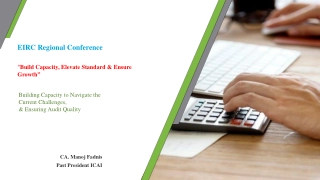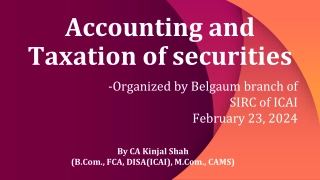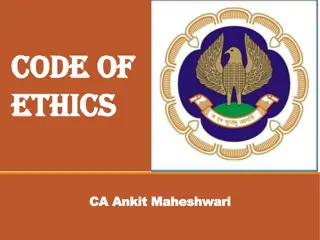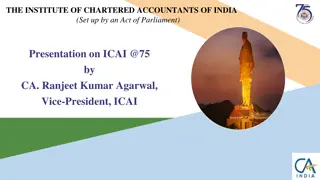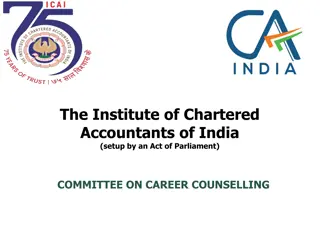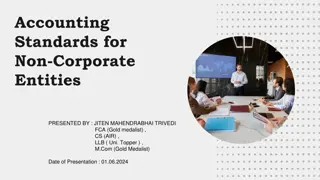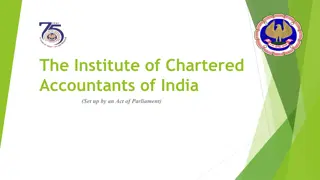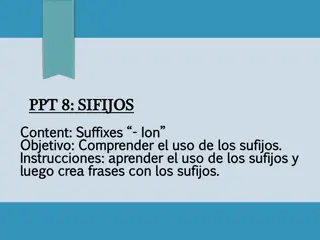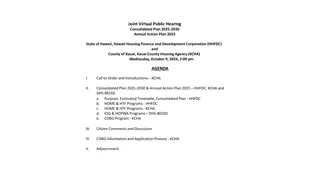
Appeal and Revision Under GST: Major Challenges and Representation by J.K. Mittal
Explore the significant challenges and representations in the realm of appeal and revision under GST as presented by J.K. Mittal. Learn about key aspects such as necessary orders, time limits, and additional grounds for appeals.
Download Presentation

Please find below an Image/Link to download the presentation.
The content on the website is provided AS IS for your information and personal use only. It may not be sold, licensed, or shared on other websites without obtaining consent from the author. If you encounter any issues during the download, it is possible that the publisher has removed the file from their server.
You are allowed to download the files provided on this website for personal or commercial use, subject to the condition that they are used lawfully. All files are the property of their respective owners.
The content on the website is provided AS IS for your information and personal use only. It may not be sold, licensed, or shared on other websites without obtaining consent from the author.
E N D
Presentation Transcript
TOPIC APPEAL AND REVISION UNDER GST- MAJOR CHALLENGES AND REPRESENTATION Presented By J.K. MITTAL (Advocate) Co-Chairman, National Council (Indirect Taxes), ASSOCHAM LL.B.,F.C.A., F.C.S. NEW DELHI Ph: 011- 22447420, 011-22461071,72,76 Email: jkmittalservicetax@gmail.com jkmittalgst@gmail.com BY ICAI AND EIRC OF ICAI SATURDAY,08THT FEBRUARY 2025 6.00 PM 07.00 PM
Presented By J.K. MITTAL (Advocate) Co-Chairman, National Council (Indirect Taxes), ASSOCHAM LL.B.,F.C.A., F.C.S. NEW DELHI Ph: 011- 22447420, 011-22461071,72,76 Email: jkmittalservicetax@gmail.com jkmittalgst@gmail.com Twitter @mittaldelhi LinkedIn JK Mittal Facebook Jai Mittal
Presented By J.K. MITTAL (Advocate) Co-Chairman, National Council (Indirect Taxes), ASSOCHAM LL.B.,F.C.A., F.C.S. NEW DELHI Ph: 011- 22447420, 011-22461071,72,76 Email: jkmittalservicetax@gmail.com jkmittalgst@gmail.com Twitter @mittaldelhi LinkedIn JK Mittal Facebook Jai Mittal
Section 107 (12) What should be necessary in the Appellate Authority order: The order of the Appellate Authority disposing of the appeal shall be in writing and shall state the determination, the decision thereon and the reasons for such decision. points for
Section 107 (13) Time limit for passing an order: The Appellate Authority shall, where it is possible to do so, hear and decide every appeal within a period of one year from the date on which it is filed. Delhi High Court has held where it is possible to do so does not mean to decided at own sweet will, the reasons has to be shown, for any delay, otherwise, adjudication proceedings is vitiated in law and quashed.
Section 107(10) Additional Grounds: allow an appellant to add any ground of appeal not specified in the grounds of appeal, if it is satisfied that the omission of that ground from the grounds of appeal was not wilful or unreasonable.
Appeal can be argued on the basis of facts on record and the ground made out in the Appeal, however, question of law if involved on the basis of the facts on record, it can argued on those points even though it is raised first time. In National Textile Corpn. Ltd. v. Naresh Kumar Badri Kumar Jagad, (2011) 12 SCC 695: it is held that 19. There is no quarrel to the settled legal proposition that a new plea cannot be taken in respect of any factual controversy whatsoever, however, a new ground raising a pure legal issue for which no inquiry/proof is required can be permitted to be raised by the court at any stage of the proceedings.
TELENOR CONSULT AS Versus COMMISSIONER OF SERVICE TAX (AUDIT-I), DELHI-I 019 (24) G.S.T.L. 393 (Tri. - Del.) appeal already filed, leaving ground in the case, which could have been favourable, even provisions of law, and jurisdictional errors were overlooked. The case referred at the hearing stage, and yet won the case, by making out a case by filing written submissions. Shyam Spectra Private Limited (formerly Citycom Network Private Limited) V Commissioner of Service Tax, Delhi II FINAL ORDER NO. 56196/2024 dated 31.07.2024 no reply filed, no hearing attended, appeal already filed without with attaching documents like service tax return filed showing exempted service, etc. The case referred at the hearing stage, and yet won the case, by making out a case by filing written submissions, as well as additional documents.
Sourav Ganguly v. Commissioner of Central Goods & Service Tax, 2020 SCC OnLine CESTAT 378 (Prayer, of Interest, no ground taken for time barred before Adjudicating Authority, no document attached facts were known to department. The Appeal was filed, with all relevant documents, and case was also made out a time barred. Interest was also sought.
Section 107 (11) can appellant authority remand back the matter No power to remand back - confirming, modifying or annulling the decision or order appealed against but shall not refer the case back to the adjudicating authority that passed the said decision or order. Allahabad High Cout has held that the Appellate Authority has no power of remand the matter to the Adjudicating Authority. 2024: AHC: 16550-DB Writ Tax No. 1417 of 2023 in M/s Krons Solutions India Pvt. Ltd. V UOI & Ors. held that 7 . Any doubt in that regard has been clarified by the legislature itself by stating that the appeal authority shall not refer the mattte back to the adjudicating authority Tvl. Shivam Steels v Assistant Commissioner (ST)(FAC), in W. P.No.15335 of 2024 .
Whether Appeal lies against order of State Tax Authority? Adjudicating Authority No. Supreme Court in Radha Krishan Industries v State of Himachal Pradesh & Ors 2021 SCC OnLine SC 334held no Appeal lies only writ petition. while considering the State GST Law, 62.. the expression adjudicatingauthority does not include among other authorities, the Commissioner .. clearly the order passed by the Joint Commissioner as a delegate of the Commissioner was not subject to an appeal under Section 107(1) and the only remedy that was available was in the form of the invocation of the writ jurisdiction under Article 226 of the Constitution. The High Court was, therefore, clearly in error in declining to entertain the writ proceedings. Section 2(4) (4) adjudicatingauthority means any authority, appointed or authorised to pass any order or decision under this Act, but does not include the [Central Board of Indirect Taxes and Customs], the Revisional Authority, the Authority for Advance Ruling, the Appellate Authority for Advance Ruling, [the National Appellate Authority for Advance Ruling,] [the Appellate Authority, the Appellate Tribunal and the Authority referred to in sub- section (2) of section 171];
Section 107(4)- delay beyond condonation period of one month. Delay in condonation for one month, if prevented by sufficient cause from presenting the appeal within the aforesaid period of three months or six months Is section 5 of the limitation Act, applies, Calcutta High Cout held yes, dealy more than one month can be condone. S.K. Chakraborty & Sons v UOI (2024) 15 Centax 172 (Cal.). However, Patna High Court in Vishal Kumar Gupta v UOI 2024 (89) G.S.T.L. 42 (Pat.) disagree with the dictum of the decision of the Division Bench of the Calcutta High Court, and held that when specific period condonation is provided, then there is exclusion of section 5 of the Limitation Act, 1963. But, Assistant Commissioner (CT) LTU v. Glaxo Smith Kline Consumer Health Care Limited 2020 SCC OnLine SC 440 Supreme Court says no. Union of India v. Popular Construction Co. (2001) 8 SCC 470] considered Section 34(3) of the Arbitration and Conciliation Act, 1996 held the expression in Section 34 but not thereafter would amount to express exclusion within the meaning of Section 29(2) of the Limitation Act.
Section 107(11) - Strange power of appellant authority for issuing SCN Section 107(11) first proviso Show cause for enhancing fine/ penalty: an order enhancing any fee or penalty or fine in lieu of confiscation or confiscating goods of greater value or reducing the amount of refund or input tax credit shall not be passed unless the appellant has been given a reasonable opportunity of showing cause against the proposed order .
Section 107(11) - Strange power of appellant authority for issuing SCN This is contrary to the settled law, the Appellant cannot be put in worst of position then what was before filing an Appeal. In Servo Packaging Ltd. v. CESTAT, Chennai, 2016 (340) ELT 6 (Mad.) it is held that ..the appellant cannot be put in a worse position, in their own appeal, and in such circumstances, the principle of no reformatio in peius would come into play, which means that a person should not be placed in a worse position, as a result of filing an appeal. It is a latin phrase, expressing the principle of procedure, according to which, using the remedy at law, should not aggravate the situation of the one who exercises it. In Jaswal Neco Ltd. v. Commissioner of Customs, Vishakhapatnam, 2015 (322) E.L.T. 561 (S.C.) it was held that the appellant cannot be worse off by reason of filing an appeal. To this limited extent, the appellant succeeds and the Tribunal s order is set aside.
Whether pre-deposit for filing Appeal can be made from electronic credit ledger or it mandatorily to be made from electronic cash ledger. Yes. Friends Mobile v State of Bihar, 2024 (80) G.S.T.L. 116 (Pat.) + Notification No. 53/2023, dated 02.11.2023 Rule 113. Order of Appellate Authority or Appellate Tribunal. (1) The Appellate Authority shall, along with its order under sub- section (11) of section 107, issue a summary of the order in FORM GST APL-04 clearly indicating the final amount of demand confirmed. (2) The jurisdictional officer shall issue a statement in FORM GST APL-04 clearly indicating the final amount of demand confirmed by the Appellate Tribunal.
Whether Appeal filed without or delayed pre-deposit is valid? Yes. CIT v. Filmistan Ltd., (1961) 3 SCR 893 : AIR 1961 SC 1134 : (1961) 42 ITR 163 However, if pre-deposit is made after expiry of time for filing an appeal, then it will be deemed that appeal was filed on that day only. Whether writ petition can be entertained in case of extreme hardship for depositing the mandatory pre-deposit amount for filing appeal? Yes. Tecnimont Pvt. Ltd. v. State of Punjab & Others 2019 (29) G.S.T.L. 737 (S.C.)
Right of appeal is not lost by withdrawal of defective/ incompetent Appeal M/s M. Ramnarain (P) Ltd. v. State Trading Corpn. of India Ltd. (1983) 3 SCC 75, Right of Appeal is statutory right and not inherent right Janardhana Rao v. CIT (2005) 2 SCC 324 Whether law laid down by judgment of the High Court will be biding despite operation of judgment is stayed by the Supreme Court? Yes. S.C. Bhattacharji v. Meerut Cantonment Board-Allahabad High Court-2005 SCC OnLine All 1500; Pijush Kanti Chowdhury v. State of West Bengal reported in 2007 SCC OnLine Cal 267
Powers of Revisional Authority Section 108 Section 2(99) RevisionalAuthority means an authority appointed or authorised for revision of decision or orders as referred to in section 108. if he considers that any decision or order passed under this Act by any officer subordinate to him is erroneous in so far as it is prejudicial to the interest of revenue and is illegal or improper or has not taken into account certain material facts, whether available at the time of issuance of the said order or not or in consequence of an observation by the Comptroller and Auditor General of India, he may, if necessary, stay the operation of such decision or order for such period as he deems fit and after giving the person concerned an opportunity of being heard and after making such further inquiry as may be necessary, pass such order, as he thinks just and proper, including enhancing or modifying or annulling the said decision or order.
Powers of Revisional Authority Section 108 (2) The Revisional Authority shall not exercise any power under sub-section (1), if (a) the order has been subject to an appeal under section 107 or section 112 or section 117 or section 118; or (b) the period specified under sub-section (2) of section 107 has not yet expired or more than three years have expired after the passing of the decision or order sought to be revised; or (c) the order has already been taken for revision under this section at an earlier stage; or (d) the order has been passed in exercise of the powers under sub-section (1): Provided that the Revisional Authority may pass an order under sub-section (1) on any point which has not been raised and decided in an appeal referred to in clause (a) of sub-section (2), before the expiry of a period of one year from the date of the order in such appeal or before the expiry of a period of three years referred to in clause (b) of that sub-section, whichever is later.
Powers of Revisional Authority Section 108 Exclusion of period of other party cases (4) If the said decision or order involves an issue on which the Appellate Tribunal or the High Court has given its decision in some other proceedings and an appeal to the High Court or the Supreme Court against such decision of the Appellate Tribunal or the High Court is pending, the period spent between the date of the decision of the Appellate Tribunal and the date of the decision of the High Court or the date of the decision of the High Court and the date of the decision of the Supreme Court shall be excluded in computing the period of limitation referred to in clause (b) of sub- section (2) where proceedings for revision have been initiated by way of issue of a notice under this section. (ii) decision shall include intimation given by any officer lower in rank than the Revisional Authority
THANKS TO ALL WISH FOR GOOD HEALTH


